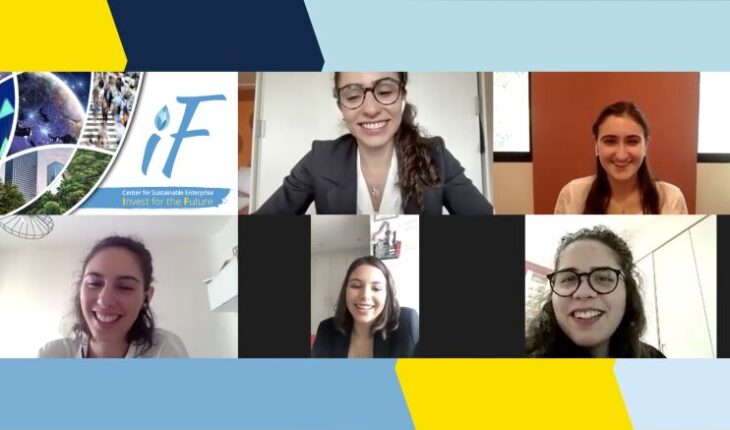By Dominick Rodrigues
Mumbai : Brazilian Students emerged victorious in the India Climate Change Challenge by presenting a solution that highlighted using agriculture residue to generate biomass — thus substituting carbon-intensive thermal power, reducing air pollution by preventing crop burning and encouraging wider gender participation.
The victorious student team “Green Winx, from Fundação Getulio Vargas in Sao Paolo, Brazil,” included Alice Grinbaum, Sophia Hess, Gabriela Pinheiro da Rocha Campos, Victória Rieser and Carol Zweig. “We spent countless nights learning different aspects about India, different financing methods and alternatives to measure impact, but it was incredibly worth it,” Zweig said, adding “The experience was not only extremely enriching and inspiring, but also eye-opening to us as students.”
UNC Kenan-Flagler Business School’s Center for Sustainable Enterprise hosted the India Impact Challenge powered by Quantum Advisors from April 16-17 2021, which witnessed six teams from six countries – Brazil, France, India, Switzerland, United Arab Emirates and the USA – making it to the finals weekend.
The India Impact Challenge had engaged students from around the world to create investment strategies to address the issues of climate change, while spurring equitable economic growth in India. Addressing the student green entrepreneurs for identifying the problem, evaluating solutions and zoning in on the best idea, Ajit Dayal, Founder, Quantum Advisors said, “It is now upto the asset allocators and owners of capital to start the process of funding your bold ideas from that ‘Save The World’ bucket.”
The India Impact Challenge objective was to draw attention of global policymakers and investment institutions on the need to shift the dialogue from a conversation dominated by efforts to reduce Greenhouse Gas emissions in the developed world and shed light on potentially alarming levels of GHG due to the necessary and continued economic development in the emerging economies. Over the next 25 years, if developing markets don’t attract capital to invest in GHG-reducing technologies and products as they continue on their path to higher GDP growth, the potential savings in emissions in the developed world could be nullified.
On the first day of the finals weekend, two teams with the highest scores made it to the final face-off, and in an unusual outcome, both teams tied with the same score, that triggered a huddle among the judges to vote for a winner. “I have not seen a final like that before in a competition like this,” exclaimed Jeff Mittelstadt (MBA ’07), executive director of the Center for Sustainable Enterprise and professor of the practice of strategy and entrepreneurship at UNC Kenan-Flagler. “These student teams diligently addressed all the feedback they received on Friday during their Saturday pitches and it showed. What a ‘photo finish’!”
The victorious student team “Green Winx, from Fundação Getulio Vargas in Sao Paolo, Brazil,” was challenged to the final vote by “Ravi EV LLP” from UNC Kenan-Flagler which included Anagha Kalvade, Lauren Ma and Brandon Siew. The other teams were fielded by· XLRI Jamshedpur from India, University of St. Gallen (HSG) from Switzerland, BITS Pilani Dubai Campus from the United Arab Emirates, HEC Paris from France.
Marlene Puffer the President of Canadian Pension Fund CN Investment Division and one of the Judges noted “The variety of proposals was remarkable and reflected solid research and creativity, I learned something from each proposal!” Lori Collins, principal of Collins Climate Consulting and a UNC Kenan-Flagler graduate, appreciated the global approach and focus on the challenge of addressing climate change through investment in India.
The competition hosted by UNC’s Center for Sustainable Enterprise featured a global Who’s Who of climate change and investment keynote speakers: Simone Robbers, Assistant Governor and General Manager of Governance, Strategy and Corporate Relations of the Reserve Bank of New Zealand; Jeb Burns, Chief Investment Officer, at the Municipal Employees’ Retirement System of Michigan; Eloy Lindeijer, former Chief of Investment Management, from the Dutch pension plan PGGM N.V; Ajit Dayal, founder of Quantum Advisors India and a UNC Kenan-Flagler graduate (MBA, 1983).
Developing countries like India are major contributors to GHG emissions and their share of annual global emissions will increase alarmingly unless they have access to capital to fund technologies and ideas which will allow them to progress on the path of continued economic growth, but with lower GHG emissions.
S. Natraj, Portfolio Manager for the Q India Responsible Returns strategy, highlighted that “India’s current per capita emission is 2.7 tonnes per annum as compared to the world average of 4 tonnes per annum per person. If every Indian in 2050 has the same consumption patterns as a resident of Europe, the UK or the US enjoy today, India alone could make a devastating hole in the Paris Climate Accord targets”
The less developed countries do not have the capital to invest the estimated annual USD 2.5 trillion required to get the planet on a more balanced path to economic development. However, the existing pools of capital with the SWFs and Pensions may be a part of the solution.
Global wealth is estimated to be over US$ 250 trillion. About US$ 100 trillion is under the control of SWFs, pensions, endowments and the Top 100 wealthiest individuals who inhabit Planet Earth. Their mandate and time horizons are long-term and inter-generational. If the owners of this pool of US$ 100 trillion were to allocate 1% of their capital each year for 3 years as catalyst investors, the world would have access to the required capital needed for investment and successfully shift to a cleaner carbon and lower GHG world, a UNC press release stated.





